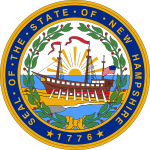
The 1964 United States Senate elections were held on November 3. The 33 seats of Class 1 were contested in regular elections. Special elections were also held to fill vacancies. They coincided with the election of President Lyndon B. Johnson by an overwhelming majority, to a full term. His Democratic Party picked up a net two seats from the Republicans. As of 2023, this was the last time either party has had a two-thirds majority in the Senate, which allowed the Senate Democrats to override a veto, propose constitutional amendments, or convict and expel certain officials without any votes from Senate Republicans. However, internal divisions would have prevented the Democrats from having done so. The Senate election cycle coincided with Democratic gains in the House in the same year.

The 1912–13 United States Senate elections were held on various dates in various states. They were the last U.S. Senate elections before the ratification of the Seventeenth Amendment in 1913, establishing direct elections for all Senate seats. Senators had been primarily chosen by state legislatures. Senators were elected over a wide range of time throughout 1912 and 1913, and a seat may have been filled months late or remained vacant due to legislative deadlock. Some states elected their senators directly even before passage of Seventeenth Amendment. Oregon pioneered direct election and experimented with different measures over several years until it succeeded in 1907. Soon after, Nebraska followed suit and laid the foundation for other states to adopt measures reflecting the people's will. By 1912, as many as 29 states elected senators either as nominees of their party's primary or in conjunction with a general election.

Henry French Hollis was a United States senator from New Hampshire, and regent of the Smithsonian Institution.
The Massachusetts Republican Party (MassGOP) is the Massachusetts branch of the U.S. Republican Party.

The 1900 New York state election was held on November 6, 1900, to elect the governor, the lieutenant governor, the Secretary of State, the state comptroller, the attorney general, the state treasurer and the state engineer, as well as all members of the New York State Assembly and the New York State Senate.

The 1938 Michigan gubernatorial election was held on November 8, 1938. Republican nominee Frank Fitzgerald defeated incumbent Democratic Frank Murphy with 52.78% of the vote.
A Massachusetts general election was held on November 6, 1956, in the Commonwealth of Massachusetts.

The 1916 Michigan gubernatorial election was held on November 7, 1916. Republican nominee Albert Sleeper defeated Democratic nominee Edwin F. Sweet with 55.83% of the vote.

The 1930 Tennessee gubernatorial election was held on November 4, 1930. Incumbent Democratic governor Henry Hollis Horton defeated Republican nominee C. Arthur Bruce with 63.8% of the vote.

The 1928 Tennessee gubernatorial election was held on November 6, 1928. Incumbent Democratic governor Austin Peay died in office on October 2, 1927. Tennessee’s Democratic Speaker of the Senate, Henry Hollis Horton became governor according to Tennessee’s gubernatorial succession law. In the general election, Henry defeated Republican nominee Raleigh Hopkins with 61.1% of the vote.

The 1902 Kansas gubernatorial election was held on November 4, 1902. Republican nominee Willis J. Bailey defeated Democratic nominee W. H. Craddock with 55.45% of the vote.

The 1904 New Hampshire gubernatorial election was held on November 8, 1904. Republican nominee John McLane defeated Democratic nominee Henry F. Hollis with 57.83% of the vote.

The 1902 Rhode Island gubernatorial election was held on November 4, 1902. Democratic nominee Lucius F. C. Garvin defeated incumbent Republican Charles D. Kimball with 53.99% of the vote.

The 1902 Tennessee gubernatorial election was held on November 4, 1902. Incumbent Democratic governor Benton McMillin did not seek re-election. Democratic nominee James B. Frazier defeated Republican nominee Henry Tyler Campbell with 61.77% of the vote.

Elections were held in Illinois on Tuesday, November 3, 1936.

A general election was held in the U.S. state of Wyoming on Tuesday, November 4, 1902. All of the state's executive officers—the Governor, Secretary of State, Auditor, Treasurer, and Superintendent of Public Instruction—were up for election. Republicans held onto all statewide offices by landslide margins.

The 1952 Missouri lieutenant gubernatorial election was held on November 4, 1952. Democratic incumbent James T. Blair Jr. defeated Republican nominee Henry Arthur with 53.16% of the vote.

The 1902 Wisconsin gubernatorial election was held on November 4, 1902.
The 1944 Massachusetts general election was held on November 7, 1944, throughout Massachusetts. Primary elections took place on July 11.

The 1902 Nebraska gubernatorial election was held on November 4, 1902. Republican nominee John H. Mickey defeated Democratic and Populist fusion nominee William Henry Thompson with 49.69% of the vote.



















